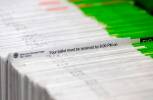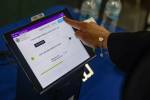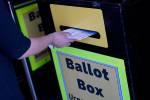Clark County elections chief endorses voter ID proposal
The head of the Clark County Election Department on Monday supported Secretary of State Ross Miller's proposal to use photos to verify voters' identities at the polls, arguing a new system could make it easier for election workers and cut down on intimidation.
Registrar of Voters Larry Lomax said political campaigns and parties now send poll watchers to ensure election clerks properly check every voter signature on paper, creating a tense atmosphere. At the same time, voters often object when asked to show ID when their signatures don't appear to match the registration book, he added.
Nevada law doesn't require showing ID before voting, but it can be requested to verify identity.
"As people start putting more emphasis on this, I can see the clerks are getting more and more uncomfortable with the process," Lomax said in an interview. "The advantage of a picture is it doesn't require any ID. If money were not an issue, I think it would be a good idea."
Miller said last week that he plans to propose a new law to replace what he called an antiquated paper signature system with an electronic roster that included photographs of each registered voter. He said it would prevent ineligible voters from impersonating someone at polling places, although he said it hasn't been a problem.
The law would allow election officials to import photos of eligible voters from the Nevada Department of Motor Vehicles database of drivers' licenses and state identification cards into an electronic poll book. The election and DMV systems already have been linked, allowing online voter registration in every Nevada county.
When a photo of an eligible voter isn't in the DMV database, a poll worker can take the person's photograph at no cost to the voter, who could sign an affidavit to verify his or her identity and then vote.
After Miller announced his plan, Democratic leaders of the Nevada Legislature questioned the need for spending money on a new photo election verification system when budgets are tight and there is no evidence of widespread voter fraud. The Legislature opens its biennial session on Feb. 4.
Miller's bill is still being drafted so it's unclear how much a photo electronic system would cost. Estimates range from $10 million to $20 million based on a similar proposal in Minnesota.
Lomax said cost also has been a factor in keeping the old-fashioned paper system in Clark County, although he would like to upgrade to an "electronic book" that would verify signatures via computer as banks and stores do. He said he didn't know the potential cost of the system, which is available from vendors.
About 30 states have voter ID laws that require some form of identification - some with a photo, some without - before a voter can cast a ballot. Miller's plan wouldn't require showing any ID because the identifying information and a photo would already be in the system based on voter registration.
A driver's license or state ID card is required to register to vote online in Nevada. In person, clerks will accept a driver's license, ID card or the last four digits of a Social Security number.
Voter rights groups object to voter ID laws, complaining that such a requirement may prevent poor and minority voters from casting ballots because they don't have or can't afford driver's licenses or other ID.
Some states, particularly in the South, have a history of voter intimidation and disenfranchising African-Americans by charging a "poll tax," which the U.S. Supreme Court declared unconstitutional.
Andres Ramirez, a Democratic consultant who has worked to protect voter rights, said Monday that he, too, supports Miller's plan. He said it could cut down on intimidation that suppresses the vote of minorities and the poor.
"The concept of having a visual verification is not a bad concept," Ramirez said. "This could be beneficial as far as protecting voters from being harassed and intimidated by poll watchers."
In a blog post Monday, Ramirez said it is common in minority communities for "voters to get challenged at polling places by poll watchers intent on disrupting the process."
They target people who are not carrying ID "to force that voter to cast a provisional ballot or to intimidate the voter from casting a ballot at all."
Ramirez said intimidation was severe this year in Arizona, which has an ID law. He noted about 600,000 ballots, including those cast provisionally by people without identification, delayed election results for days.
In Clark County, Lomax said about 6,000 provisional ballots were cast, most of which were counted after Election Day. Most involved voters who showed up at the wrong polling place or weren't registered to vote after all. He said not one of the cases involved voters who didn't have an ID to verify their signatures.
Lomax said the only major incident this year involved the arrest of a Henderson woman, Roxanne Rubin, who was accused of voter fraud after she tried to vote twice, apparently to test the system during early voting.
According to an affidavit in the case, a poll worker overheard Rubin tell a man that clerks didn't check her ID.
"I signed my name differently, and they did not ask for ID," she said.
Contact Laura Myers at lmyers@reviewjournal.com or 702-387-2919. Follow @lmyerslvrj on Twitter.























